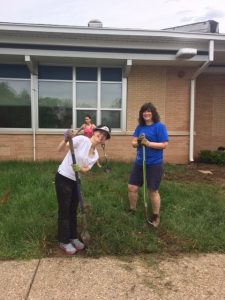 Leona Williams, teacher at Brandywine School District’s Forwood Elementary School, has made significant changes to how she teaches science as a result of her years as a NextGen teacher leader. Now she says she is looking forward to transforming her instruction even further with the information she and others will gain on Delaware’s new science assessment, set to be operational in the 2018-19 school year.
Leona Williams, teacher at Brandywine School District’s Forwood Elementary School, has made significant changes to how she teaches science as a result of her years as a NextGen teacher leader. Now she says she is looking forward to transforming her instruction even further with the information she and others will gain on Delaware’s new science assessment, set to be operational in the 2018-19 school year.
“The data we’ll be able to gather as a state will help shape science instruction and future assessments,” she said. “For teachers, we’ll be able to better identify our students’ strengths and needs to guide our next steps in the classroom. The assessments will help us understand if we’ve been successful in facilitating broader student learning rather than having [students] narrowly focus on a specific topic.”
For more than a year, Delaware educators have been working collaboratively across districts and charter schools to create a system of assessments that measures students’ true science mastery. Phase I of the assessment planning began in Fall 2016 when students and educators participated in a research and development process to create test items. Final drafts of these items are now available online for all educators to use in classrooms.
Phase II of the plan began this fall with Delaware educators helping to design an assessment system that aligns to existing technology. Phase II also includes a Spring 2018 field test in grades 5 and 8 and in high school biology.
Williams, a 2016 Presidential Awards for Excellence in Mathematics and Science Teaching (PAEMST) finalist and a 2018 Delaware Teacher of the Year nominee, is on the state’s test item review committee to develop the types of tasks and questions included on the field test and final assessment.
The test items she and others have created go beyond multiple choice and short answer questions to include innovative items that ask students to apply their science knowledge and skills to real-world situations. These types of assessments help students, families and educators gain valuable information on students’ mastery of the Next Generation Science Standards (NGSS), replacing the state’s current Delaware Comprehensive Assessment System (DCAS) science exam for grades 5, 8 and 10.
“NGSS requires students to become more active learners,” said Williams. “Instruction engages students with a phenomenon then students ask questions, plan and carry out investigations, analyze data to build understanding. Because we are preparing students to understand the world around them and to have a positive impact on the world, they need to understand information presented to them in various forms.”
At the building level, much of the work around transitioning to NGSS is being led by NextGen Teacher Leaders. For four years, the department has provided an ongoing professional learning opportunity for 200 NextGen teacher leaders and 21 team leads from schools throughout the state. These teachers meet monthly to learn about NGSS and how to use a system of classroom assessments to support student learning. NextGen teachers also receive leadership training on adult learning and coaching skills to support the work of leading the NGSS transition back in their schools.
“Having Delaware teachers design and develop tests that they know will have real impact in the classroom is key to creating our state’s strong science assessment system,” said Secretary of Education Susan Bunting. “Teachers have been leading this process from the beginning by developing test items and providing feedback on what students truly need to thrive in science, and they are thus continuing to elevate science education across the state.”
Also key to the adoption of NGSS and the development of the state’s enhanced science assessment is the Delaware Science Coalition, a group of educators, district and charter leaders, and representatives from the state’s higher education and business communities focused on providing all students with high-quality science instruction. The Delaware Science Coalition requires all curriculum and materials be vetted through a year-long process that includes use of the EQUiP rubric, development of gap lessons and embedded assessments, as well as field testing and a larger, in-class pilot. The coalition then reviews the materials and pilot results to determine if districts and charters will use the materials before students engage in the lessons on a larger scale.
For more information on the great things happening in schools across Delaware, sign up to receive Take Note: Education in the First State at http://www.doe.k12.de.us/takenote. Take Note is published the final Wednesday of each month.